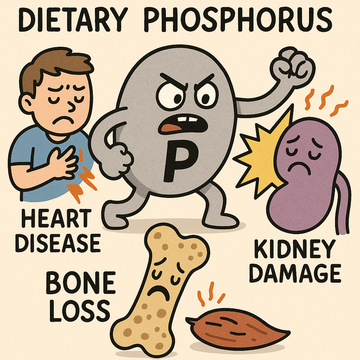Can Kidney Stones Be Prevented Through Diet and Acid-Base Balance?
by Christopher Brainard on Jun 28, 2025

Published on: July 2, 2025 | Kidney Health
Kidney stones are a common and painful condition, affecting up to 10% of people during their lifetime. These stones form when minerals such as calcium, oxalate, or uric acid become concentrated in the urine, leading to crystal formation.
While many stones pass naturally, others require medical attention. This raises an important question: Can some kidney stones be prevented—or even dissolved—through diet and lifestyle? In some cases, research suggests the answer may be yes.
📚 R. Phillips, et al. (2015) - "Citrate salts for preventing and treating calcium-containing kidney stones in adults." Cochrane Database Syst Rev
🧬 What Are Kidney Stones Made Of?
There are several types of kidney stones, each with different causes and management strategies:
- Calcium oxalate (most common)
- Calcium phosphate
- Uric acid
- Struvite (often related to infection)
- Cystine (genetic)
Understanding the stone type is essential for developing the most effective prevention strategy.
💧 Key Prevention Strategies
1. Support Healthy Levels of Citrate and Bicarbonates
Increasing dietary intake of alkali-forming compounds—such as citrate and bicarbonate salts—may help reduce calcium stone formation and support balanced urine pH.
Several clinical studies have explored the use of citrate and bicarbonate as part of medically supervised strategies for managing kidney stone risk, particularly for uric acid stones and low urinary citrate levels.
📖 A. Trinchieri et al. (2009) – Dissolution of radiolucent renal stones by oral alkalization
📖 M.A. Ene et al. (2023) – The effectiveness of citrates and pyridoxines in the treatment of kidney stones
A. Why Bicarbonates May Be Lacking in the Western Diet
Naturally occurring bicarbonates are rare in modern diets because they break down when exposed to heat (above ~122°F). This means most cooked or processed foods offer little or no bicarbonate benefit.
Some individuals turn to purpose-formulated electrolyte beverages or dietary supplements that contain bicarbonate salts to help support their overall alkali intake.
B. Understanding Citrates vs. Citric Acid
While citric acid is found in fruits like lemons and oranges, the citrate form is different. Citrate acts as a base and has been studied for its role in urinary pH regulation and calcium stone prevention. Only citrate (not citric acid) has the buffering properties that support acid-base balance and potential stone prevention.
2. Reduce Oxalate and Animal Proteins
High levels of oxalate and uric acid in the diet can contribute to stone formation.
- Limit high-oxalate foods like spinach, beets, chocolate, and nuts
- Reduce intake of animal protein, especially organ meats and processed meats
- Stay well hydrated to dilute urine concentration
3. Manage Calcium Intake Naturally
Calcium should ideally come from food—not over-supplementation. Too much or poorly absorbed calcium may increase stone risk, depending on the individual’s metabolic profile.
🧪 Can Kidney Stones Be Dissolved Naturally?
Some uric acid stones may dissolve when urine pH is increased to around 6.0–6.5. This may be supported through a combination of:
- An alkaline-forming diet
- Adequate hydration
- Medically guided use of alkalizing agents or supplements
Note: Calcium oxalate stones typically cannot be dissolved once formed, but they may be preventable through dietary and hydration strategies.
🧠 Bottom Line
- Certain types of kidney stones, especially uric acid stones, may be managed or reduced by improving acid-base balance.
- Bicarbonates and citrates, when consumed through diet or supplements, may support healthy urinary chemistry in appropriate cases.
- Hydration, mineral balance, and food choices all play a role in kidney stone prevention.
⚖️ Disclaimer
This article is provided for informational and educational purposes only. It does not constitute medical advice or a diagnosis, and is not intended to promote or recommend any specific product or treatment. Always consult your healthcare provider before making changes to your diet or supplement routine.



